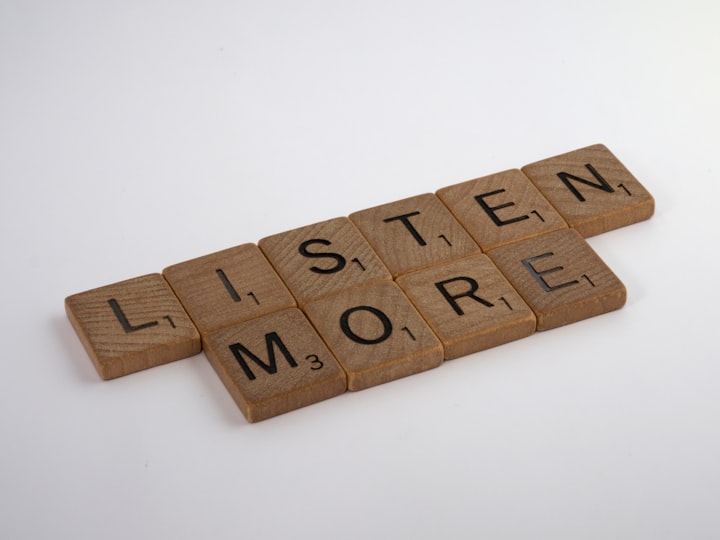Power of Spoken Words
How to impress people with the power of spoken words

Spoken words have the power to transform your life and those who listen to your words.
Words, when spoken correctly, can have a significant impact on our listeners. It can be very motivating, generate positive feelings, and lead to major life transformation. Teachers, coaches, motivation speakers come to our mind.
If the same words are spoken with different styles and emotions, it can have major consequences that can make the listener feel uncomfortable and uneasy.
However, if the same words are spoken with indifferent style and tone, they may not have any impact. The listener or the audience may remain indifferent after listening to the spoken words. Yes, boring or bow-ring.
As an example, a professional stand-up comedian can deliver a better punchline and get more applause than a novice comedian on the same joke. Similarly, a leader can deliver a message with more impact than if the same message is delivered by an ordinary person.
Isn't that amazing?
Words, in themselves, will have no meaning unless they are spoken in a particular tone, style, or with energy.
In this article, we will explore the art of talking and delve into various aspects of talking that can help us become better and more influential speakers.
Talk is cheap. Anyone can talk.
It is not just what you talk about.
It is how you talk - how you present the information.
Talking is essentially presenting information to the listener through spoken words. However, while talking, the speaker also infuses the spoken words with emotions, tone, pitch, and, most importantly, vibrations and energy.
It does not matter how much you talk. What matters is how eloquently we speak.
Talking eloquently is an art.
The spoken words must make the listener feel good.
While talking may seem like a natural ability, mastering that art is not easy.
But if we practice and incorporate some of the steps listed here regularly, we can master this art in no time.
1. Think, before you talk
Before we open our mouths, make sure we have a clear knowledge and understanding of the topic we are going to talk about.
If you do not know about that topic, just say, "I do not have knowledge about this information" or something similar.
The audience can detect if you are trying to put on a show with effusive words.
Speak only when it is absolutely necessary. Otherwise, remain silent.
At times, silence is golden.
There is a popular saying that is attributed to some leaders or scriptures, "It is better to keep one's mouth shut and be thought a fool than to open it and remove all doubt."
2. Listen before you talk
The first step in becoming a skilled speaker is to be an active listener.
I have written a separate article on the "Art of Listening" here. We will just cover some highlights here.
True communication involves both speaking and listening. When engaged in a conversation, give your full attention to the speaker, maintain eye contact, and show genuine interest in what they are saying.
Before you respond or speak, pause for a moment, take a deep breath, and listen to the silence.
This pause gives your mind clarity and gathers thoughts for your speech.
3. Choosing the right words
Spoken words have a profound impact on how our message is received.
Choosing the right words means
- Be clear and concise
- Simple words instead of unnecessary jargon, or acronyms
- Mindful of the context
- Emotional state of the listener.
- Explain the context and meaning of any unfamiliar or technical words.
Choosing the right words also means avoiding the use of harsh, foul, or sarcastic language that can hurt the feelings of the listeners.
4. Tone of your voice
The tone of your voice is very important in speaking. Match your tone with the natural surroundings. On all occasions, speak in a normal and quiet tone.
Avoid raised voices or loud tones in any settings.
5. Speak with conviction
If you speak with conviction, the listener will believe in what you have to say.
When you speak with conviction, you display confidence, sincerity, and passion for your ideas and beliefs.
Speaking with conviction gives credibility and makes it easier to persuade others to support your opinions or statements.
Avoid presenting rigid thoughts or forcefully imposing your views.
6. Know your listener and audience
Try to speak from the listener's perspective. If you can build empathy and connect with your audience's feelings, then most listeners will be captivated.
If you know your audience, then be prepared with the topic and the type of audience you are addressing.
7. Be aware of your body language and appearance
Words, complemented by your body language, play a crucial role in conveying your thoughts and emotions.
Instead of appearing tense, put on a smile.
Smile improves your face value.
Try to maintain a relaxed posture, and if necessary, use appropriate hand gestures.
8. Use Humor
In any conversation, if possible, try to use humor.
Humor eases tension and relaxes the mood, making the conversations more open and enjoyable.
However, avoid humor in a serious setting, as it may offend or hurt feelings.
9. Style of speaking
Everyone has a unique style of speaking and it depends on the setting.
We speak formally and professionally in a public setting, and at parties we can be casual and conversational.
A good speaker will adapt their speaking style based on the context, audience, and message they want to convey.
10. Words have power
When we speak, we are generating and sending sound vibrations in the air.
These vibrations have the power to influence, not only the listener but also our own mind and our soul.
Remember, whenever we speak, either loudly, or to ourselves, we are the first listener.
That is why it is very important to choose our words carefully.
Choose your words wisely.
One way to influence our body and mind positively is through the recitation of mantras. Mantras are very potent. They carry lots of power and energy with high vibrations.
Mantras are sacred sounds, words, or short phrases that are repeated or chanted as part of spiritual or meditative practices. Mantras when uttered in a right setting and right time can imbibe immense benefits on the person who is reciting the mantra and also on the listeners. I will cover this in a separate article.
«««««««««««««««««««««««««»»»»»»»»»»»»»»»»»»»»»»»»»»»»»
Art of Spoken Words
In summary, we can speak from our minds only if we use the right words, tone, and style.
By choosing to speak the right words, mastering our body language, and being open to learning from others, we can become better speakers.
Remember, the art of talking is not just about expressing our ideas; it is about making others feel heard, respected, and valued.
So, let us strive to master the art of talking and create a conflict-free world where meaningful conversations always flourish.
Thanks for reading. If you have new thoughts please feel free to leave any comments.
About the Creator
Raghavendra S Rao
Passionate about life, people, animals, nature, and surroundings. Love flying airplanes. Educate everyone in various phases of life. Love technology. Learn new things. Help and contribute time and money to the less fortunate.






Comments
There are no comments for this story
Be the first to respond and start the conversation.